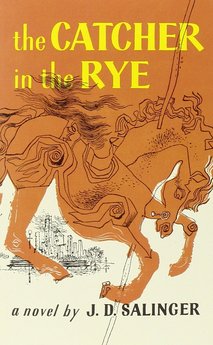 by Ranelle Irwin I’d always heard about The Catcher in the Rye by J.D. Salinger. It’s been on numerous banned book lists and has caused parents to question the moral integrity of high school English programs all over the United States. Naturally, this only heightened my desire to read it over winter break. Salinger creates an engaging conversational tone by adapting his writing style to follow patterns of speech—from the way we enunciate certain syllables to the way that conversations are often cyclical and repetitive rather than logical and straightforward. Holden and Mr. Antolini, a former teacher, talk at the end of the book about Holden’s Oral Expressions class. Richard Kinsella, a boy who didn’t always stick to the point, led the schoolboys to shout, “Digression!” every time Richard veered off-topic. Holden says, “I mean I guess he should’ve picked his uncle as a subject, instead of the farm, if that interested him most. But what I mean is, lots of the time you don’t know what interests you most till you start talking about something that doesn’t interest you most . . . What I think is, you’re supposed to leave somebody alone if he’s at least being interesting and he’s getting all excited about something.” In some ways, the book models this idea—it doesn’t always stay on topic and it brings up old topics, copying them almost verbatim. Some readers may find this off-putting since it deviates from the storytelling techniques in a typical novel, but in a sense, it heightens the realism in the story. Real life is not always straightforward, and Salinger captures this brilliantly. Some readers will find some of the references and topics dated—and at times, laughable. For instance, Holden is criticized by his younger sister or other people he knows because of his foul language characterized by God’s name in vain. (For contrast, one of the books read at my high school used the f-word copiously. The fact that people still call out this book for its explicit language makes me chuckle.) Cigarettes are smoked by everyone and their mother, and the word “necking” is used to refer to making out and to insinuate sexual desire. If these things don’t offend you, you probably won’t object to the “immoral” content of the book. Where the book particularly shines is when it leaves you questioning. Was Holden sexually abused? Is he mentally ill? Why is he obsessed with “phonies”? Why is he focused on the ducks? Holden is also a compulsive liar, which leads the reader to wonder whether or not he’s even telling us the truth. Some may find Holden unlikable and see the story as a tale of him whining about the world. Upon reflection and research, the book takes a different shape—one of adolescent struggles, feelings of loneliness, and a semblance of immaturity that colors all of our pasts in some way. He’s not a lovable character, but he’s painfully relatable. If you read this when you were younger, I encourage you to read it again in a few years. You may be able to see Holden—and yourself—in a different light.
1 Comment
2/12/2023 02:40:33 am
Thanks for sharing the article, and more importantly, your personal experience of mindfully using our emotions as data about our inner state and knowing when it’s better to de-escalate by taking a time out are great tools. Appreciate you reading and sharing your story since I can certainly relate and I think others can to
Reply
Leave a Reply. |
Archives
April 2021
Categories |
- Home
- About
-
Issues
-
2024 cover page
>
- Editors' Note (2024)
- Fifty-two Minutes
- The Day I Love Myself More Than You
- Shadows
- Bloodlust: The Metamorphosis
- picture this
- rite of passage
- Bathroom Floor
- Cat
- M
- 삼년상 (Sam-Nyun-Sang)
- Valley
- I'm More Than
- I'm Not a Toy
- Rising Phoenix
- Grow
- Canvas
- red :3
- Green Cousins
- The Lighthouse
- Sea of Plants/Planets
- Kitty's Poem
- Fin
- tomie
- Library Class
- Our Lie
- Weavers
- An Old Tree
- A World Without You
- All Must Die
- Flower
- The Canoe
- It's Scary Up Here
- Beautiful Things
- Ma Vie
- The Final Wall
- Hosts
- Waqe Zhiga
- two faced feelings
- imposter syndrome
- Feminism
- Pretty Girls
- It's Just Us
-
See You in Another World (2023)
>
- Editors' Note (2023)
- Voices of the Summer Night
- Lightning Glut
- All The Little Things
- From a Distance
- Confined
- The Night Hours
- A Contrapuntal for the Girl in My Dreams
- Go Back (before they do)
- Snippet of Thought
- The Darkness
- Her Nature
- I Listen
- Stranger In The City
- What Music Does
- Fallen Stranger
- The Black Dress
-
A Fire of Words (2022)
>
- Editors' Note (2022)
- The Floor Wallows Lower
- Cornflowers
- Erudite
- That One Morning
- mom, im afraid
- selenophilia
- Roses and Rainbows
- If a poisonous snake bites itself, will it die?
- Rochester
- Crown of Branches
- Stairs to the Sea
- A Poem Written Entirely From Advertisements
- Pyromania
- silhouette of a bird against winter stars
- thunderstorm in the bedroom
- A Night in Recovery
- sleeping gypsie
- paper dolls&goodbyes
- We Are Women
- Village Air
- Sunshine's Laughter
- the male gaze
- The Forensic Entomologist
- Lacking
- Drowning
- Adelie
-
Create the Wonders We Dream (2021)
>
- Editors' Note (2021)
- Zove
- I'm Sorry
- Fake Smile
- My Friend the Balloon
- Eyes Intertwined
- Perfect
- Only a Moment
- A Dangerous Word
- My Dreams
- The Last 100 Meters
- The Green Void (Villanelle)
- The Whimsical Galaxy (Sestina)
- The Silent Kindness
- Pressure
- Table on the Hill
- The Yukon
- The Shore
- Repentance
- Her and I
- Infections of the Soul
- Threads
- Dream of a High Schooler
- Empty
- little flame
- scars
- black and white
- The Cat
- Joy
- Sweet Honey Bee Stings
- If There Were One Day
- Delete
- Our Hearts to Central Vietnam
- him or Him?
- Ocean
- Es Llaner Beach
- Sewn Together
- Rain
- Yes, I Like
- The Legacy of the Moon
- The Wind Whimpers
- From Here I See
- To Feel Clean
- Red
- Survival
- Substance
- Golden Lies
- Midnight Tango
- Ode to a Spleen
- Modern Siren
- The Night's Diamond Tears
- Beats In Double Time
- A Day in the Flight
- Carved By Venus
- Lifeline
- Everest
- Education
- How Much of Reality Can Be Observed
- What is a Spork
- What is the difference between love and in love
- What would you have wanted? me to say
- Planet Caravan
- The Journey of a Minute
- The Circus of Scars
- Mosaic
- Color
- Love and Acceptance
-
Colors I Never Knew Existed (2020)
>
- Editors' Note (2020)
- Two Weeks' Notice
- A Curious Man
- An Eternity Swathed in Cobwebs
- Hidden Memories: A Villanelle
- A Better Place
- Conscription
- Just Breathe
- Akko
- The Hungry Dark
- And Then Something Shuffled
- Deodorants are a Girl's Best Friend
- The Old House
- Willow
- Perfection
- She Will Be Queen
- Nothing But Space
- a wicked thing
- Anthony
- Cheesecake
- Za
- Coco
- Coexist
- der böse Mann
- Feeding
- Catharsis
- I HAD TO RENAME THIS POEM DUE TO COPYRIGHT ISSUES
- For All The Kids Who Were Told They'd Never Make It... and Believed This
- i Will Always Love You
- Our 4
- Rainy Day
- Space
- The Ocean Cares Nothing of Man
- Sickly Sweet Love
- I call the eating disorder hotline
- Bright and Sunny Day
- Grandma in the Moon
- Interminable Education in Seventeen Syllables
- Macrocosmic Creation
- Middle Class Psyche
- My Sister
- From a Park Bench
- Rain
- A Recollection of Our Memories
- Sadie Got Me in My Feelings
- Uranium Rose
- When I Grow Up - Paige Rhoads
- Who am I?
- 49-53
-
Words Become Reality (2019)
>
- Editors' Note (2019)
- Bear Down: A Sestina
- Kidnapped & Killed
- Lemonade
- Rise
- Someone Who always Pays
- A Simple Story
- The King's Battle
- Aftermath
- Aging Population
- Can we still be friends?
- Carpe Diem
- Coffee
- Day to Day
- Do Not Hold me Closer, Let me Go
- Gift of Time
- Love Everlasting
- A Message to the Youth
- Peach
- Waiting for the Bell
- Randy
- The River & The Earth
- The Show Goes On
- Summer Love
- Sundae
- West Coast Wishing
-
Watch Every Second (2018)
>
- Editors' Note (2018)
- White
- eleven eleven
- Growing Up
- Claustrophobia
- The Cage
- The Soldier's Return
- Spacing Out
- Depression
- Mona Lisa
- Childhood Cancer
- Puberty
- Languish
- A Magical Ending
- Life
- Barter
- Descent into Space
- Red Water
- The Short Film
- Starting Line
- And I Am From?
- Such a Foreign Concept
- You Say
- My Creator
- The Most Common Illness
- Reflection in Time
- Ode to My Mirror
- Time
- See Me
- Consequences
- Where I'm From
- Unstoppable
- Her Voice Remains (2017) >
-
2024 cover page
>
- Blog
- Submit
- Contact

 RSS Feed
RSS Feed